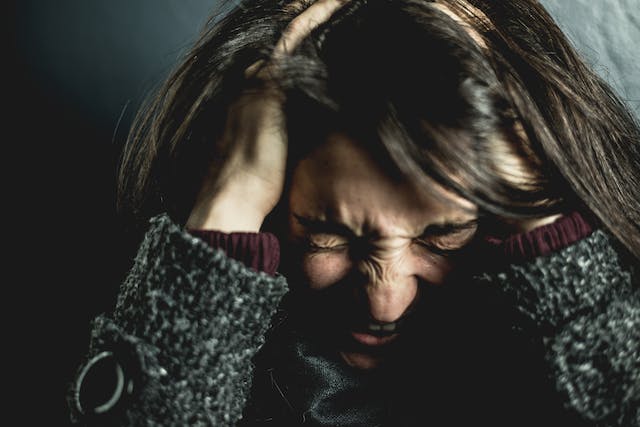 |
| Don't let stress ruin your hair and scalp health. |
Wellness Starts at the Roots: Stress and Scalp Health
Do you find yourself stressing out and suffering from hair or scalp issues? While you may be familiar with the fact that stress can impact your mental and physical health, you may not realize the profound impact it can have on something as seemingly unrelated as your hair and scalp.
According to various studies, stress management plays a pivotal role in the health and appearance of the hair and scalp. For instance, a Harvard study confirmed that stress can lead to hair loss by impairing hair follicle stem cells.
If you want to maintain a lustrous mane while looking out for your overall well-being, it's crucial to understand the intricate relationship between stress and hair and scalp health.
This article describes the mechanisms at play and provides practical tips for effective that can lead to healthier and more vibrant hair and scalp.
The Science Behind Stress and Hair Loss
 |
| Make your hair go from stress to shine. |
Stress is a natural response that triggers the release of certain hormones, most notably cortisol, commonly known as the "stress hormone." While cortisol is essential in your daily life by aiding your fight-or-flight response, chronic stress can overproduce this hormone. Additionally, prolonged stress can weaken the immune system, making it less effective in maintaining scalp health.
Below are some of the common conditions you can suffer if stress becomes too much.
- Telogen effluvium
Stress can cause an abnormality in the hair growth cycle by pushing more hair follicles into the resting phase (telogen phase). The result is increased hair shedding, which can lead to visible hair thinning. While telogen effluvium is typically temporary, it can be distressing and significantly impact your hair's volume and appearance.
- Trichotillomania
Trichotillomania, an impulse control disorder, is an urge to pull out one's hair. It's usually a coping mechanism for stress or anxiety. This condition can cause substantial hair loss and be challenging to manage without addressing the underlying factors. Left untreated, you can have bald spots or even permanent baldness.
- Alopecia areata
Since alopecia areata is an autoimmune disorder, the immune system mistakenly targets hair follicles. The exact cause of this condition is unknown, but stress can be a contributing factor in triggering or exacerbating the condition. The immune system's overreaction to stress can attack hair follicles, resulting in bald patches on the scalp.
- Scalp psoriasis
Psoriasis, also an autoimmune skin disorder, causes red, scaly patches to develop on the skin. Since stress weakens the immune system, inflammation may increase. Plus, symptoms like itching, scaling, and discomfort might worsen.
Other Hair and Scalp Concerns Linked to Stress
Besides the conditions named above, stress can manifest in other ways that impact the health and appearance of your hair and scalp. Here are some examples.
- Hair thinning and shedding
Apart from telogen effluvium, stress-induced hair thinning and shedding can occur due to hormonal imbalances and inflammation triggered by prolonged stress. The noticeable reduction in hair density can cause some to lose confidence in the thickness and appearance of their hair.
- Hair breakage
Stress can weaken hair, making it more prone to breakage. The release of stress hormones can affect the hair's protein structure, resulting in brittle strands that are more likely to snap or split. Hair breakage can give the appearance of thinning and lead to a reduction in hair volume.
- Dandruff and dry scalp
Stress can disrupt the balance of the scalp's natural oils, leading to dryness or excessive oil production. This imbalance can contribute to the development of dandruff or itchy and flaky scalp. Stress can also worsen dandruff, weakening the immune system's ability to manage the naturally occurring yeast on the scalp.
- Delayed hair growth
Since chronic stress can disrupt the hair growth cycle, hair regrowth tends to slow down. It can be particularly frustrating if you're experiencing hair loss and hoping your hair will return to its full, healthy state.
- Premature graying
While not directly related to hair loss, stress may have something to do with premature graying of the hair. It could be the impact of stress on melanin-producing cells. Stress accelerates the aging process, extending to the scalp and hair. Premature graying, hair thinning, and wrinkle formation on the scalp are all potential outcomes of chronic stress.
- Scalp tension and discomfort
Stress can show up as physical tension in the body, including the scalp. Scalp tension can lead to discomfort, tightness, and even headaches. These physical symptoms can worsen the perception of overall scalp health.
- Worsening of existing scalp conditions
If you're already dealing with chronic scalp conditions such as eczema or contact dermatitis, stress can exacerbate these issues. The weakened immune response and increased inflammation can lead to more frequent flare-ups and worsened symptoms.
Another common scalp condition that stress can trigger is seborrheic dermatitis, characterized by flaky, itchy, and red skin. It's often associated with the overgrowth of yeast-like funguses on the scalp.
Tips for Managing Stress
Source: Pexels
The effects of stress can vary from person to person, and even our genes can play a role in our susceptibility to certain conditions. Whether it's work burnout or personal challenges, managing stress is essential for overall well-being. Here are practical strategies to promote a healthy scalp and hair.
Stress-reducing activities
- Quality sleep - Getting 7 to 9 hours of quality sleep each night is crucial because a well-rested body can better handle stress. Establish a regular sleep routine, keep your sleep environment comfortable, and avoid stimulating activities before bedtime. Investing in a good mattress and pillows that support your sleep posture can also contribute to quality sleep.
- Exercise - Regular physical activity is an excellent stress-reducer and mood improver because it releases endorphins. Go for at least 30 minutes of moderate exercise daily. Whether it’s a brisk walk, a home workout routine, or a virtual fitness class, finding an activity that you enjoy can make a big difference in your physical and mental wellbeing.
- Meditation - Mindfulness meditation, deep breathing exercises, or yoga can help manage stress. These techniques promote relaxation, reduce cortisol levels, and enhance your ability to cope with stressors. Engaging in regular mindfulness practice can lead to improved attention, better emotional regulation, and a heightened overall sense of well-being.
- Other techniques - Consider stress-reduction techniques such as journaling, art therapy, or engaging in hobbies you enjoy. Finding healthy outlets for stress can be incredibly beneficial.
Proper hair care practices
- Gentle handling - Be gentle when washing and styling your hair. Avoid excessive pulling, tugging, harsh brushing, or excessive shampooing. Opt for lukewarm water to cleanse your scalp effectively without stripping away natural oils. Use a wide-toothed comb or soft brush with natural bristles to gently detangle your hair and prevent breakage.
- Quality hair products - Choose suitable products for your hair type. Avoid products with sulfates and other harsh chemicals to retain your scalp's natural oils.
- Regular trims - Regular hair trims help prevent split ends and keep your hair looking healthy. Trimming can also make your hair more manageable and reduce breakage.
- No over-styling - Limit the use of heat styling tools like straighteners, curlers, and blow dryers. Whenever possible, let your hair air-dry to minimize heat damage. Additionally, avoid tight hairstyles like braids, ponytails, and buns, which can pull on your hair and cause breakage. Giving your hair breaks from these stressors is key to managing hair fall.
Nutritional recommendations
- Balanced diet – Your diet must be rich in vitamins, minerals, and protein. Foods like fish, eggs, nuts, and leafy greens provide essential nutrients for healthy hair. Avoid processed foods as they are often high in saturated and unhealthy fats, added sugar, and sodium.
- Multivitamins and biotin - A daily multivitamin can help ensure you get essential nutrients for your hair and scalp. If you suspect a deficiency, consider a biotin supplement as it can positively impact hair and nail health. It’s advisable to consult with your doctor before starting any supplements.
- Omega-3 fatty acids - Incorporate sources of omega-3 fatty acids, such as salmon, flaxseeds, and walnuts, into your diet. These healthy fats support scalp health and can reduce inflammation.
- Iron and zinc - Adequate iron and zinc levels are vital for hair growth. Foods like lean red meat, beans, and whole grains can help you maintain these nutrient levels.
- Hydration - Drinking enough water is fundamental for the health of your entire body, including your scalp. Aim for 8-10 glasses of water daily to keep your scalp hydrated and promote healthy hair growth. Proper hydration keeps your skin and hair follicles healthy.
Balancing Stress for Beautiful, Healthy Hair and Scalp
In pursuing healthier, more vibrant hair and scalp, you can't overlook the influence of stress. The mind-body connection is a powerful force, impacting not only your overall state but also the condition of your hair and scalp. Managing stress, along with a balanced diet, is the key to addressing these issues.
Be patient and consistent in your efforts because it may take time for these lifestyle changes to manifest visible improvements in hair and scalp health.
Ultimately, the journey to healthier hair and scalp begins within. Self-care, stress management, and a commitment to nurturing your mental and physical well-being can help you achieve a healthier look and feel and a more balanced life.
Author: Tamika Cua is an aspiring freelance writer navigating the adventures and misadventures of adulthood. Her writing explores all things adulting: work, wellness, relationships, and the crazy stuff in between. When not writing, you can usually find Tamika scrolling through the internet, indulging in a cup of coffee (or two!), and constantly seeking new inspiration for her next article.


